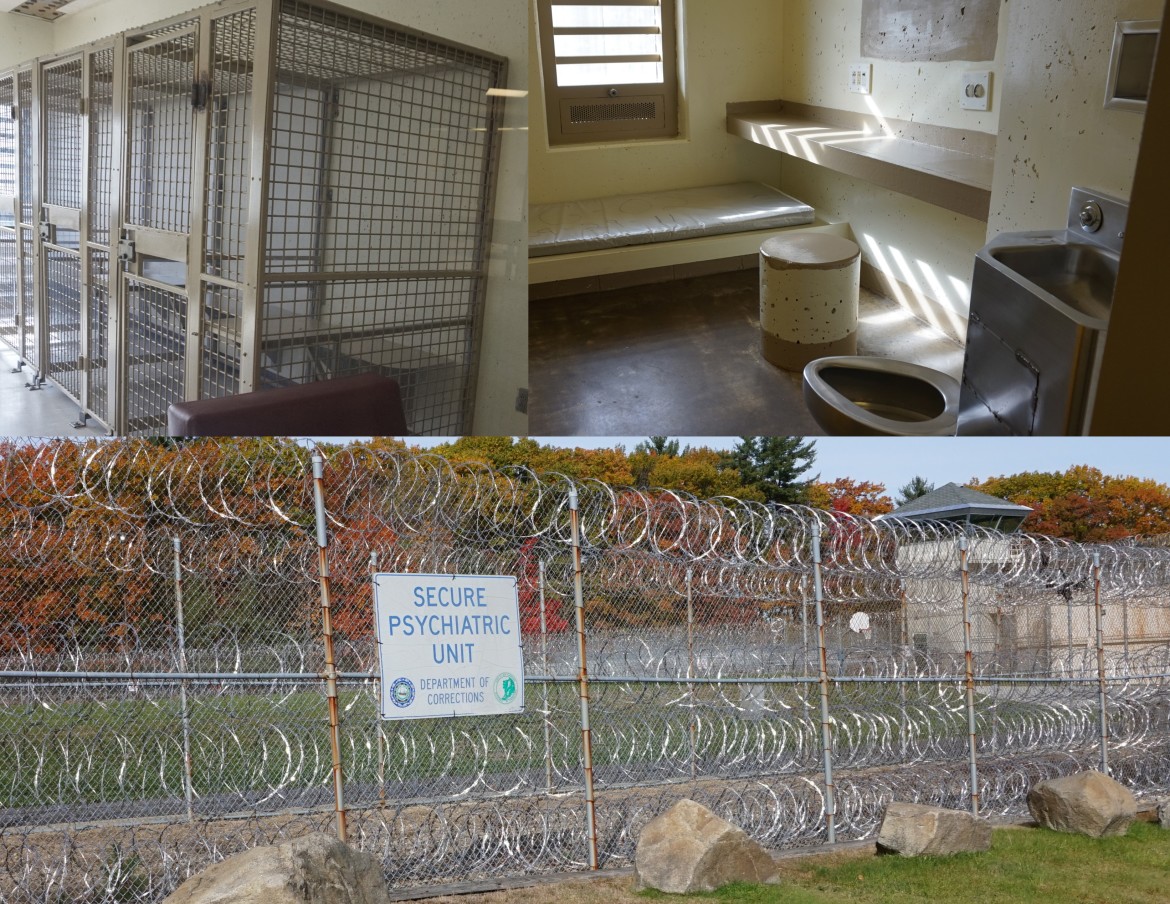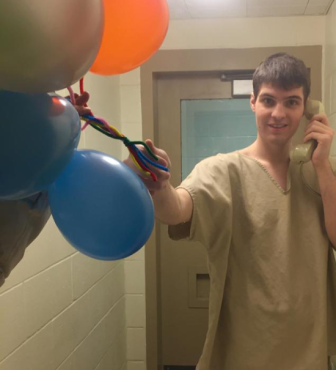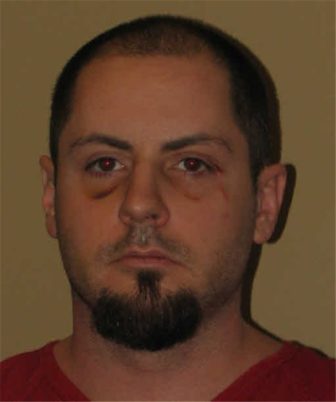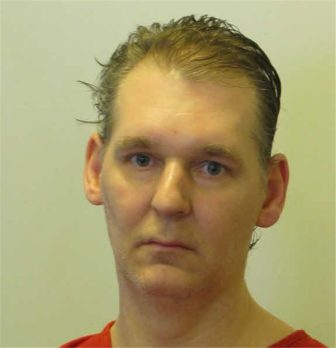THIS COULD BE YOUR CHILD NEXT!
NH POPULATION STILL WAITING
FOR THE STATE TO OBEY BOTH NH's CONSTITUTION AND ALL STATE LAWS!
PLEASE HELP STOP NH GOVERNMENT FROM KIDNAPPING PEOPLE (FOR 30 YEARS). WHO WERE "CIVILLY COMMITTED" INTO HOSPITALS WITH MENTAL HEALTHCARE NEEDS, THEN KIDNAPPED AND PLACED IN PRISON, WEARING JAILHOUSE CLOTHING, IN LOCKDOWN FOR 23 HOURS A DAY. THEY ARE EVEN SHACKLED AND TASERED LIKE CRIMINALS.
"She feared for her son’s life because a middle-aged man in a cell near Corey’s had died and no one would say what had happened."
"He was singled out as an example patients who are admitted to New Hampshire Hospital for psychiatric treatment but are then transferred to the Secure Psychiatric Unit at the prison without ever having a criminal proceeding."
"Beatrice Coulter, a registered nurse who became an outspoken critic of the unit after working there for only a few days before quitting in disgust, testified that housing civilly committed people with mental illness with criminals in prison violates the Constitution and the Americans With Disabilities Act."
"Andrew Butler, 21, was civilly committed (2 weeks ago) to the New Hampshire Hospital, the state’s psychiatric hospital. But civilly committed patients can be transferred to the NH prison unit if they are considered a danger to themselves or others and can’t safely be housed at the hospital."
Our State Constitution’s Bill of Rights (Part I, Article 14), says that everyone is entitled to a certain remedy for all injuries they may receive and that they are to obtain it “completely, and without any denial; promptly, and without delay.”
Our State Constitution’s Bill of Rights (Part I, Article 14), says that everyone is entitled to a certain remedy for all injuries they may receive and that they are to obtain it “completely, and without any denial; promptly, and without delay.”
“I can only go visit him one day a week,” Douglas Butler said. “He can’t phone me because the phones don’t work. And I can’t call him. It’s an awful situation.”
“He is locked down 23 hours a day. He has been tasered. The treatment he has received is cruel and unusual punishment without having been convicted of a crime and with no pending criminal process”
 |
| Photo by Nancy West: People are dying in here unnecessarily |
FORCING CIVILLY PATIENTS INTO "TELEPHONE BOOTH SIZE CAGES" FOR THERAPY WITH ACTUAL CRIMINALS CHARGED WITH SEX CRIMES, ASSUALT AND WORSE, ACTUAL SERIOUS CRIMES, SOME ARE REAL PSYCHOTIC CRIMINALS CHARGED AND SENTENCED THAT ARE EVEN TO UNFIT TO EVEN STAND TRIAL
__________________________________________________NH Disability Rights Center Is Monitoring
Complaints Against Secure Psychiatric Unit
March 28, 2018
CONCORD – The Disability Rights Center is monitoring the rights and safety of individuals with mental illness who are locked up at the Secure Psychiatric Unit at the New Hampshire State Prison for Men, according to DRC staff attorney Andrew Milne.
“We monitor throughout the state,” Milne said, “but certainly the Secure Psychiatric Unit has come up a number of times in complaints about conditions there.”
The monitoring could result in a decision to conduct an investigation, depending on the availability of resources, Milne said.
There are a variety of patients at the Secure Psychiatric Unit who have not been convicted of and sometimes have not been charged with a criminal offense. They are housed with convicted criminals who have mental illness.
“We do have concerns about the appropriateness of that setting for individuals with mental illness – in particular individuals who have not been convicted of any crime who are nevertheless placed there in a prison setting under the Department of Corrections’ control, which we question the therapeutic value of and the effectiveness of the mental health treatment,” Milne said.
"He singled out as an example patients who are admitted to New Hampshire Hospital for psychiatric treatment but are then transferred to the Secure Psychiatric Unit at the prison without ever having a criminal proceeding."
The Department of Corrections declined to comment.
The process of incarcerating mentally ill patients who haven’t been convicted of a crime in New Hampshire has been controversial since it started decades ago. The most recent attempts by state Rep. Renny Cushing, D-Hampton, and Advocates for Ethical Mental Health Treatment to halt the practice have failed.
September 2017
By Nancy West
Raza’s son, Corey Peterson, was civilly committed to the New Hampshire Hospital a little over two years ago, then transferred to SPU even though he hadn’t committed a crime.
While on a 24-hour watch, Corey pulled out all of his fingernails and toenails. “He said he needed to make them even,” Raza said.
At SPU, Raza and other family members were forced to undergo background checks and were held to the same rules as anyone visiting the state prison, even though the Department of Corrections insists that SPU is a hospital, not a prison. Critics are quick to point out, however, that SPU lacks hospital accreditation or outside professional oversight.
During much of Corey’s stay at SPU, Raza was banned from family meetings about his treatment. She believes it was because she questioned and second-guessed the medical staff relative to Corey’s medication and treatment.
For the last few months that he was at SPU, Raza was banned from visiting Corey altogether because of an incident that occurred on his 24th birthday.
Raza took balloons into a non-contact visit at SPU and asked Corey to pretend to hold them by pressing his hand against the glass partition while he spoke to her on the prison phone. Raza took pictures on her cell phone and sent them to family members.
“I really thought it might be his last birthday,” Raza said, so she risked bringing in her cell phone to get photos knowing it could be considered prison contraband.
She feared for her son’s life because a middle-aged man in a cell near Corey’s had died and no one would say what had happened. A corrections officer seized her phone that day, and she has been afraid to retrieve it because she was threatened with arrest.
Corey languished for most of two years at SPU, Raza said, but that changed after news reports were published locally detailing her criticism of SPU and the balloon incident. A VICE TV reporter showing up at SPU helped dramatically, too, she said, even though that report hasn’t yet aired.
Suddenly, Corey started receiving daily psychiatric treatment and became well enough to be returned to the New Hampshire Hospital, Raza said. He has since been released to a halfway house and is hoping to attend college, although Raza said she is still not satisfied with his care.
In a separate matter, the Disability Rights Center filed a federal lawsuit last month seeking access to the death investigation of Phillip Borcuk, 34, who died while being held at the Residential Treatment Unit, which is upstairs from the Secure Psychiatric Unit, at the State Prison for Men.
Milne said the Department of Corrections has turned over some, but not all records of Borcuk’s death investigation and the federal court case continues.
The Residential Treatment Unit is described as a specialized unit for inmates with mental illness who are unable to function in the general inmate population.
In news release last month, the DRC cited news reports that said Borcuk was mentally ill and died Dec. 6, 2017 alone in his cell due to self-injurious behavior at the State Prison for Men in Concord.
Borcuk was admitted from Sullivan County Superior Court into the Department of Correction custody in 2012 for charges of operating after being certified as a Habitual Offender, Theft by Unauthorized Taking and Assault by Prisoner. His parole eligibility date was Dec. 5, 2018 with a maximum release date of Dec. 5, 2019.
Disability Rights Center is a statewide non-profit organization dedicated to eliminating barriers for people with disabilities in New Hampshire. In the Borcuk lawsuit, the DRC sought an injunction against the department’s interference with a federally authorized investigation in violation of the Protection and Advocacy for Individuals with Mental Illness Act.
The PAIMI Act authorizes DRC to investigate suspected abuse and neglect of individuals with mental illness and obligates facilities such as prisons to cooperate by promptly producing requested records.
A separate death
The estate of Charles Mealer, who died unexpectedly at age 47 at the Secure Psychiatric Unit on June 25, 2015, is suing the Department of Corrections.
The lawsuit claims Mealer’s death was caused by “acute amitriptyline intoxication,” a drug he was being prescribed at the time.
Mealer, who had been transferred in and out of the Secure Psychiatric Unit several times since he was sentenced to state prison in 2011 on two counts of felonious sexual assault, had a long psychiatric history which included suicidal ideation and several suicide attempts, according to the lawsuit filed by Manchester attorney Larry Vogelman.
May 2, 2018
By Nancy West
After InDepthNH.org published a story Friday about Andrew’s situation, more than 600 people signed a petition to get him released from the Secure Psychiatric Unit. A “Free Andrew Butler” page set up on You Caring by one of his friends quickly raised more than $800.
Members of the Hollis/Brookline Community Facebook page pledged all kinds of support, including promises to contact Gov. Chris Sununu, media outlets and various lawmakers.
John Porter, whose son Evan is close friends with Andrew, says he isn’t exactly sure what is happening with Andrew, but he has pledged his full support for the family – have dozens of other members of the Hollis community.
“I know him well. I love Andrew,” said Porter, whose son Evan is coming home from college in a couple of weeks, and is also eager to help, Porter said.
Porter learned of the situation in a story about a writ of habeas corpus Andrew’s lawyer filed in federal court last week seeking his release from prison to a mental health treatment facility.
Andrew’s attorney, Sandra Bloomenthal, wrote: “He is held as a mental health patient without being in an accredited hospital, denied contact visits with his father, denied contact visits with his attorney, forced to wear prison clothing.
“He is locked down 23 hours a day. He has been tasered. The treatment he has received is cruel and unusual punishment without having been convicted of a crime and with no pending criminal process,” Bloomenthal wrote.
Department of Corrections spokesman Jeff Lyons said he couldn’t confirm that Andrew is being held at the Secure Psychiatric Unit because of confidentiality rules.
Lyons couldn’t comment on the writ filed in federal court and Assistant Attorney General Rebecca Ross said she would find out who in the office is handling the case, although the office may not have been served the writ as yet.Andrew’s father, Douglas Butler, said his son is unaware of the outpouring of support from his hometown.
“I can only go visit him one day a week,” Butler said. “He can’t phone me because the phones don’t work. And I can’t call him. It’s an awful situation.”
Andrew was civilly committed to the New Hampshire Hospital, the state’s psychiatric hospital. But civilly committed patients can be transferred to the prison unit if they are considered a danger to themselves or others and can’t safely be housed at the hospital.“When he was in New Hampshire Hospital, I could go up and we could eat pizza together any time, but in prison all that is gone. It is a prison, that’s what it is,” Butler said.
Butler has contacted state Rep. Renny Cushing, D-Hampton seeking help. Cushing has been fighting to stop the practice of incarcerating people in the Secure Psychiatric Unit who haven’t committed a crime with convicted criminals who are mentally ill.
Cushing’s most recent legislation, House Bill 1565, will be voted on Wednesday in the state Senate. Cushing said the bill has been gutted. Instead of requiring the Secure Psychiatric Unit be accredited by the Joint Commission as a psychiatric hospital, the bill would require accreditation from the National Commission on Corrections Health Care as a behavioral health facility.
“We monitor throughout the state,” Milne said, “but certainly the Secure Psychiatric Unit has come up a number of times in complaints about conditions there.”
The monitoring could result in a decision to conduct an investigation, depending on the availability of resources, Milne said.
There are a variety of patients at the Secure Psychiatric Unit who have not been convicted of and sometimes have not been charged with a criminal offense. They are housed with convicted criminals who have mental illness.
“We do have concerns about the appropriateness of that setting for individuals with mental illness – in particular individuals who have not been convicted of any crime who are nevertheless placed there in a prison setting under the Department of Corrections’ control, which we question the therapeutic value of and the effectiveness of the mental health treatment,” Milne said.
"He singled out as an example patients who are admitted to New Hampshire Hospital for psychiatric treatment but are then transferred to the Secure Psychiatric Unit at the prison without ever having a criminal proceeding."
The Department of Corrections declined to comment.
The process of incarcerating mentally ill patients who haven’t been convicted of a crime in New Hampshire has been controversial since it started decades ago. The most recent attempts by state Rep. Renny Cushing, D-Hampton, and Advocates for Ethical Mental Health Treatment to halt the practice have failed.
September 2017
By Nancy West
 |
Corey Peterson is pictured on his 24th birthday at Secure
Psychiatric Unit State prison in Concord, NH
|
While on a 24-hour watch, Corey pulled out all of his fingernails and toenails. “He said he needed to make them even,” Raza said.
At SPU, Raza and other family members were forced to undergo background checks and were held to the same rules as anyone visiting the state prison, even though the Department of Corrections insists that SPU is a hospital, not a prison. Critics are quick to point out, however, that SPU lacks hospital accreditation or outside professional oversight.
During much of Corey’s stay at SPU, Raza was banned from family meetings about his treatment. She believes it was because she questioned and second-guessed the medical staff relative to Corey’s medication and treatment.
For the last few months that he was at SPU, Raza was banned from visiting Corey altogether because of an incident that occurred on his 24th birthday.
Raza took balloons into a non-contact visit at SPU and asked Corey to pretend to hold them by pressing his hand against the glass partition while he spoke to her on the prison phone. Raza took pictures on her cell phone and sent them to family members.
“I really thought it might be his last birthday,” Raza said, so she risked bringing in her cell phone to get photos knowing it could be considered prison contraband.
She feared for her son’s life because a middle-aged man in a cell near Corey’s had died and no one would say what had happened. A corrections officer seized her phone that day, and she has been afraid to retrieve it because she was threatened with arrest.
Corey languished for most of two years at SPU, Raza said, but that changed after news reports were published locally detailing her criticism of SPU and the balloon incident. A VICE TV reporter showing up at SPU helped dramatically, too, she said, even though that report hasn’t yet aired.
Suddenly, Corey started receiving daily psychiatric treatment and became well enough to be returned to the New Hampshire Hospital, Raza said. He has since been released to a halfway house and is hoping to attend college, although Raza said she is still not satisfied with his care.
Death probes
 |
Philip Boruck, 34, NHID# 42416,was in the
Department's Resident Treatment Unit
|
Milne said the Department of Corrections has turned over some, but not all records of Borcuk’s death investigation and the federal court case continues.
The Residential Treatment Unit is described as a specialized unit for inmates with mental illness who are unable to function in the general inmate population.
In news release last month, the DRC cited news reports that said Borcuk was mentally ill and died Dec. 6, 2017 alone in his cell due to self-injurious behavior at the State Prison for Men in Concord.
The PAIMI Act authorizes DRC to investigate suspected abuse and neglect of individuals with mental illness and obligates facilities such as prisons to cooperate by promptly producing requested records.
A separate death
 |
Charles Mealer died in NH SPU
in 2015
|
The lawsuit claims Mealer’s death was caused by “acute amitriptyline intoxication,” a drug he was being prescribed at the time.
Mealer, who had been transferred in and out of the Secure Psychiatric Unit several times since he was sentenced to state prison in 2011 on two counts of felonious sexual assault, had a long psychiatric history which included suicidal ideation and several suicide attempts, according to the lawsuit filed by Manchester attorney Larry Vogelman.
May 2, 2018
By Nancy West
 |
| Andrew and his father Douglas Butler |
Members of the Hollis/Brookline Community Facebook page pledged all kinds of support, including promises to contact Gov. Chris Sununu, media outlets and various lawmakers.
John Porter, whose son Evan is close friends with Andrew, says he isn’t exactly sure what is happening with Andrew, but he has pledged his full support for the family – have dozens of other members of the Hollis community.
“I know him well. I love Andrew,” said Porter, whose son Evan is coming home from college in a couple of weeks, and is also eager to help, Porter said.
Porter learned of the situation in a story about a writ of habeas corpus Andrew’s lawyer filed in federal court last week seeking his release from prison to a mental health treatment facility.
Andrew’s attorney, Sandra Bloomenthal, wrote: “He is held as a mental health patient without being in an accredited hospital, denied contact visits with his father, denied contact visits with his attorney, forced to wear prison clothing.
“He is locked down 23 hours a day. He has been tasered. The treatment he has received is cruel and unusual punishment without having been convicted of a crime and with no pending criminal process,” Bloomenthal wrote.
Department of Corrections spokesman Jeff Lyons said he couldn’t confirm that Andrew is being held at the Secure Psychiatric Unit because of confidentiality rules.
Lyons couldn’t comment on the writ filed in federal court and Assistant Attorney General Rebecca Ross said she would find out who in the office is handling the case, although the office may not have been served the writ as yet.Andrew’s father, Douglas Butler, said his son is unaware of the outpouring of support from his hometown.
“I can only go visit him one day a week,” Butler said. “He can’t phone me because the phones don’t work. And I can’t call him. It’s an awful situation.”
Andrew was civilly committed to the New Hampshire Hospital, the state’s psychiatric hospital. But civilly committed patients can be transferred to the prison unit if they are considered a danger to themselves or others and can’t safely be housed at the hospital.“When he was in New Hampshire Hospital, I could go up and we could eat pizza together any time, but in prison all that is gone. It is a prison, that’s what it is,” Butler said.
Butler has contacted state Rep. Renny Cushing, D-Hampton seeking help. Cushing has been fighting to stop the practice of incarcerating people in the Secure Psychiatric Unit who haven’t committed a crime with convicted criminals who are mentally ill.
Cushing’s most recent legislation, House Bill 1565, will be voted on Wednesday in the state Senate. Cushing said the bill has been gutted. Instead of requiring the Secure Psychiatric Unit be accredited by the Joint Commission as a psychiatric hospital, the bill would require accreditation from the National Commission on Corrections Health Care as a behavioral health facility.